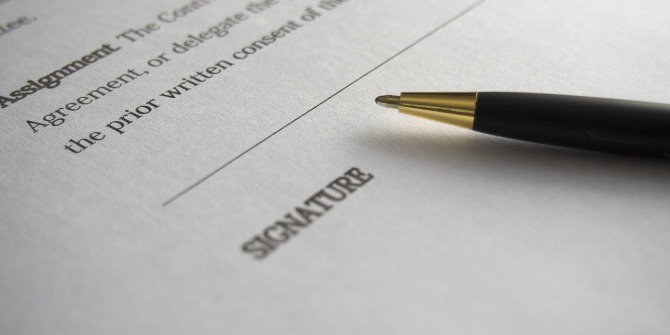
Overconfidence is a common error that can lead people to make poor choices because they misforecast future product usage and overestimate their abilities to navigate contract terms. The value of a gym membership depends on how often you think you will go to the gym, and the value of a mobile phone contract depends on how much data you think you will use. Your willingness to enter into a contract depends on whether you are confident that you can avoid late fees or other penalties, or whether you worry that such fees will prove difficult to avoid and expensive.
In their aptly titled study of a New England health club, “Paying Not to Go to the Gym”, DellaVigna and Malmendier argue that individuals overpay for gym memberships because they overestimate their own powers of self-control—they expect to regularly get off the couch to go to the gym, but in fact rarely do. Another common mistake of the overconfident is to overestimate how quickly they will repay credit-card debt. These overconfident borrowers may ignore the interest rates that credit-card companies charge after introductory rates expire because they wrongly expect to pay-off balances within the introductory period—a prediction supported by Ausubel’s study of consumer responses to credit card offers.
In another example from my own research, I find that overconfidence explains why individuals systematically choose the wrong monthly mobile-phone plans. Consumers mistakenly believe that they can choose a calling plan that is, as Goldilocks would say, “just right”, having neither too large an allowance of data that goes wasted, nor too small an allowance that leads to expensive overage charges. In fact, as an industry executive once told me (and is also borne out in the data), “people absolutely think they know how much they will use and it’s pretty surprising how wrong they are.”
Poor choices in gym memberships, credit cards, and mobile-phone plans all result from mistaken beliefs about future usage of the products. Yet perhaps an even more common error is overestimating one’s ability to navigate contract terms. For instance, experiments conducted by Silk and Ericson suggest that although people recognize that they may not follow through to collect mail-in rebates, they still underestimate the extent of the problem. Similarly, people are often unconcerned by offers that include costly terms such as high late fees, over-limit fees, or automatic renewal clauses because they think they will be the exception and avoid such penalties and pitfalls. They usually aren’t. As a result, overconfident consumers overestimate the benefits and underestimate to costs of contracts that include these terms.
In each setting described above, overconfidence leads consumers to make bad decisions that cost them money. Yet this is only the beginning of the story. In a recent article, I focus on further consequences of overconfidence. The first insight I highlight is that many contractual terms, like mail-in rebates, and late-fees—the very terms that commonly trip people up—may be included in contracts precisely because people often overestimate their benefits or underestimate their costs. Absent overconfidence, contracts might be much more straight forward. Why after all do firms commonly offer mail-in rebates? As Scott Adams’ Dilbert cartoon humorously suggests, firms may offer rebates to exploit the overconfident who forget to collect them.
A second insight is that competition among firms may fail to protect people from their own mistakes, and we may need to rely on consumer protection policy instead. However, policies designed to prevent firms from exploiting overconfidence do not necessarily help consumers. For instance, Matt Osborne and I predict that requiring cellular carriers to alert customers when they exceed usage allowances (as U.S. carriers must now do) would help consumers avoid unwanted overage charges. However, we also predict that firms would offset the lost overage fee revenue by raising monthly fees and making other price changes that actually leave many consumers worse off. In other cases, however, consumer protection policy can be tremendously successful. Agarwal and co-authors find no offsetting price response by banks when the 2009 Credit Card Accountability Responsibility and Disclosure (CARD) Act curtailed U.S. credit-card late fees and over-limit fees—instead the entire $12 billion yearly reduction in fees directly benefits U.S. credit-card holders as intended.
Happily, there is a way forward for regulators hoping to know when to try to help. My analysis shows that two concrete, measurable statistics—consumers’ sensitivity to prices and the willingness of firms to pass on cost increases to consumers in the form of higher prices—impact the potential effectiveness of proposed regulations. Distinguishing markets in which regulation may have limited benefit (as in cellular services) from those in which regulation may substantially help consumers (as in credit cards) can enable policy makers to intervene when effective and avoid unnecessary regulation otherwise.
♣♣♣
Notes:
- This post is based on the author’s paper Overconfident Consumers in the
Marketplace, Journal of Economic Perspectives—Volume 29, Number 4, Fall 2015, Pages 9–36.
- This post gives the views of its author, not the position of LSE Business Review or the London School of Economics.
- Featured image credit: edar, Pixabay – Public Domain
 Michael D. Grubb is an Associate Professor of Economics at Boston College. He is an expert in behavioural industrial organisation whose recent research has focused on overconfidence, bill-shock regulation, and consumer inattention. His research interests include applied microeconomic theory, industrial organisation, online advertising and market design. He is an associate editor of the Journal of Industrial Economics, and is on the advisory board of the Rubicon Project. He was previously an Assistant Professor of Applied Economics at MIT Sloan School of Management, a Visiting Scholar at Harvard University, and a consulting researcher at Microsoft Research. He holds a B.S. in Engineering & B.S. in Economics from the University of Pennsylvania, an M.Phil. in Economics from the University of Oxford and a Ph.D. in Business Administration from Stanford University.
Michael D. Grubb is an Associate Professor of Economics at Boston College. He is an expert in behavioural industrial organisation whose recent research has focused on overconfidence, bill-shock regulation, and consumer inattention. His research interests include applied microeconomic theory, industrial organisation, online advertising and market design. He is an associate editor of the Journal of Industrial Economics, and is on the advisory board of the Rubicon Project. He was previously an Assistant Professor of Applied Economics at MIT Sloan School of Management, a Visiting Scholar at Harvard University, and a consulting researcher at Microsoft Research. He holds a B.S. in Engineering & B.S. in Economics from the University of Pennsylvania, an M.Phil. in Economics from the University of Oxford and a Ph.D. in Business Administration from Stanford University.





